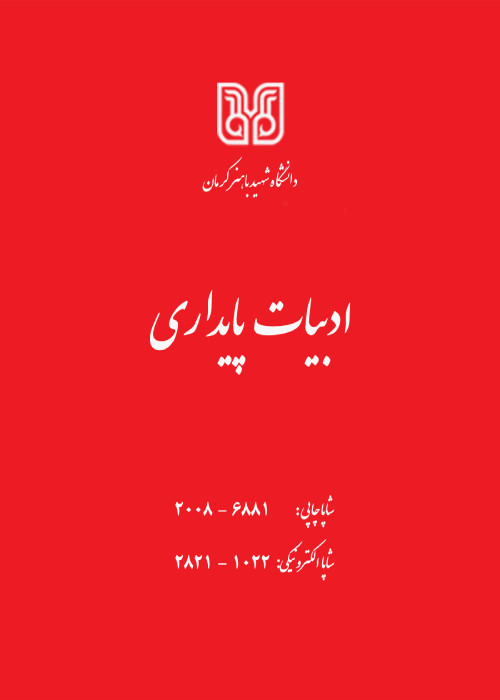Evaluating the Components of Resistance Literature in the Works of Mirza Agha Khan Kermani(Literary Commitment, Patriotism, Anti-authoritarianism)
Resistance literature is an important genre of literature that includes poetry, fiction, drama, and so on. Resistance literature communicates themes on human reactions to circumstances arising in their sociopolitical life, prompting them to take a stand.The present study aims to introduce and evaluate components in the history of Kerman literature during the Qajar era, concurrent with the start of the Constitutional Revolution, based on the concepts and definitions of resistance literature and centered on the thoughts and ideas of Mirza Agha Khan Kermani as one of its most famous advocates. Given his life and works, he can be called a poet, author, historian, intellectual, militant, and a political, social, and literary critic and journalist. Thus, he is a prominent literary, political, and social polymath.Mirza Agha Khan’s main line of thought and method in his numerous works express a particular policy line, struggle, and resistance on the path of great ideals such as freedom, raising awareness, anti-authoritarianism, nationalism, and political, social, and literary commitment. Although certain criticism can be directed at some of his thoughts, ideas, and method of expression, the significance of his honest articulation and militant spirit based on his perception of the cultural, social, and political conditions that his time required of him cannot be disregarded. In this context, he can be placed among the prominent authors of resistance literature in the contemporary era.A range of concepts and components pertaining to resistance literature can be found in the works of Mirza Agha Khan Kermani. Of these, the three components of committed literature, nationalism, and anti-authoritarianism feature on the higher echelonsinhis works as the most significant components of resistance. Hence, the main research question is asked as follows:What are the components of resistance literature in the works of Mirza Agha Khan Kermani?To answer the main question, three secondary questions also arise, as follows:How didcommitted literature emerge in the works of Mirza Agha Khan Kermani?What position does nationalism hold in the works of Mirza Agha Khan Kermani?What position does anti-authoritarianism hold in the works of Mirza Agha Khan Kermani?
The descriptive-analytical method has been used to conduct this theoretical research. Data was collected using the library research method and analyzed qualitatively. The entire collection of poetry and prose by Mirza Agha Khan Kermani used in this research is available in print and manuscript.
3.1. Committed literature Apart from his sociopolitical personality and persistent struggles against Qajar rule, Mirza Agha Khan Kermani is also a poet and literary critic. Ketab-e Rezvan (Rezvan's Book) and the verse epic Nāmeh-ye Bāstān [Letter of Antiquity] provided him with an exclusive literary status among the authors and poets of the constitutional era. The mission of the pen from the viewpoint of Mirza Agha Khan goes beyond morality and self-refinement. Inspired by Seyed Jamal Eddin Asadabadi who sees underdeveloped countries as being more in need of their penmen, Mirza Agha Khan names the inability to provide their primary needs as one of the reasons for their underdevelopment. He believes that literature is on a mission and must share in the happiness and dejection of nations. He conducts a comparison on this subject between the West and Iran and states that Westerners have perfected poetry while Iranians have used it as a tool for begging, exaggeration, idle talk, and nonsensical panegyrics and satire. 3.2. Patriotism and nationalism Another important aspect in the dialectic of Mirza Agha Khan Kermani is patriotism and nationalism. This is a significant manifestation of committed literature in his works. His boundless love for Iran and everything Iranian, as well as his abhorrence for anything that, in his view, endangers the homeland can be seen in every aspect of his thinking. Mirza Agha Khan can be seen as a passionate nationalist who endeavors to revive Iran’s lost glory based on surviving documents from its past. By relying on the new ideas of his time about factors leading to progress and the backwardness of a nation, he sought a culprit to justify the deplorable state of Iran in those days. His love for Iran is so strong that he has managed to exaggerate the causes of its backwardness and its culprits. But none of this can negate his pure compassion and interest in Iran and Iranians. 3.3. Anti-authoritarianism Mirza Agha Khan has defined words and concepts such as “despot”, “revolution”, and “patriot” in his works to mention the concepts of oppression, authoritarianism, and tyrant. Although these definitions are similar to those at the beginning of the book Maktubat by Mirza Fatali Akhundzadeh, they are still a sign of his attention and familiarity with such topics. The main criticism by Mirza Agha Khan of authoritarian regimes is that kings do not know the real meaning of governance and are oblivious to global developments in this respect. He believes that the perception of Iranian rulers of the politics of their day is superficial and unrealistic.
Committed literature, nationalism, and anti-authoritarianism are some of the most important aspects of resistance literature which can be seen in the works of Mirza Agha Khan Kermani. Aside from being one of the main designers of constitutional literature in Iran as a progressive and critical literature bearing the exclusive features of resistance literature, Mirza Agha Khan Kermani has always believed in the mission of the pen and literature in raising awareness in society and has used his pen as a tool for militancy. By considering the differences between the patriotism and nationalism found in the works of Mirza Agha Khan Kermani, it must also be noted that he was in love with Iran and everything Iranian. He is among the first architects of Iranian identity and nationality in the new era and his nationalism is evident in his various works. Anti-authoritarianism must be considered the most important component of resistance in the works of Mirza Agha Khan Kermani. His attention to words and expressions such as despot, revolution, and patriot indicate his familiarity and sensitivity towards these topics. In his view, all the Iranian governments from the beginning of history, even the governments of ancient Iran, were despots and authoritarians, and none have ever thought that there exists another way to govern apart from
this method.
- حق عضویت دریافتی صرف حمایت از نشریات عضو و نگهداری، تکمیل و توسعه مگیران میشود.
- پرداخت حق اشتراک و دانلود مقالات اجازه بازنشر آن در سایر رسانههای چاپی و دیجیتال را به کاربر نمیدهد.




